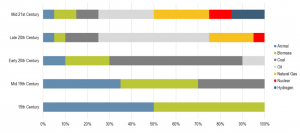Photo by Meghal Janarda
This is a guest blog post from Zoe Reep, who is an undergraduate mathematics major at Michigan Tech. Zoe can be reached at zkreep@mtu.edu
As our society has grown in population, technology, and abilities, so has its need for energy. And as our need for energy has grown, we have been forced to step outside of early methods of capturing and extracting this energy. Over time, society has shifted from reliance on muscular and biomass sources such as animal labor and firewood in the 15th century to a reliance on fossil fuels such as coal, oil, and natural gas in the late 20th century (Evolution of Energy Sources).
Figure 1: Graph representing the evolution of energy sources across periods of time (Evolution of Energy Sources).
In the late 1900s, influential writer and scientist Amory Lovins took a critical look at the future of our energy sector in his essay “Energy Strategy: The Road Not Taken?.” He proposed that there are two ways in which society can proceed: the hard path, society’s current path characterized by intense fossil fuel consumption and lack of regard to the environmental effects of such consumption; and the soft path, the path that Lovins believed to be the better alternative characterized by renewable energy and the commitment to energy conservation and efficiency.
Those in support of the hard path argue that fossil fuels and nuclear energy alone can sustain our ever-growing population, with its ever-growing desire for energy, if we simply alter our extraction, conversion, distribution, and usage methods to be more efficient. Proponents of the hard path believe that society should focus on providing incentives, such as tax breaks and subsidies, for fossil fuel companies to encourage the exploration and extraction of coal, uranium, and petroleum. Following the decline of the availability of fossil fuels, these hard-pathers support a shift to nuclear power. Typically, those in support of the hard path envision a future of expensive, centralized systems (Newton).
In contrast, those in support of the soft path hold the belief that a reliance on solely fossil fuels is not only unsustainable in the long run, but dangerous. They believe that creating and sustaining large, concentrated facilities for power production enables powerful companies to dictate energy’s place in society and turns energy into a socioeconomic issue. Instead of these centralized systems, proponents of the soft path favor more local energy retrieval methods, such as solar panels on buildings or the use of wind turbines on properties. Additionally, soft-pathers would like to see society slowly transition from a heavy reliance on fossil fuels to a more dispersed reliance on renewable energy sources such as hydro, geothermal, solar, and wind power (Newton).
Lovins views sparked a time of controversy, but also brought up an important issue: which direction is the direction that we need to move in order to ensure that our successors have the same abilities to live full and meaningful lives as we do?
We’ve reached a point where it is difficult to argue that there isn’t something wrong with our current energy industry. [Check out https://ourworldindata.org/fossil-fuels for a look at the increase in fossil fuel consumption. Think our current methods can keep up with the ever-growing demand for energy?] Scientists and researchers have been presenting more and more evidence that our current path is unsustainable and that we might even reap the irreversible consequences of our procrastination and selfish desires in our lifetime. It is beginning to seem that the majority of people recognize the correlation between the dependence on fossil fuels and Earth’s degrading environment and atmospheric conditions , so what’s stopping us from converting to a more sustainable alternative?
We have grown increasingly dependent on energy and the comforts and commodities it supplies to us. We believe that others will find an answer for us, and that the answer will allow us to continue our life of ease. We hold the assumption that our own individual efforts will not produce change, since we are merely a single ant in the midst of a ginormous colony.
I tested a thought that I had on my Energy and Society class. I wanted to see if, when provided the education of why change was important and the means of producing that change, my peers would change small areas of their life that they had grown up comfortable with to benefit the world around them.
We had spent the previous class walking around campus and discussing areas that we felt could be improved, through methods such as user awareness or the implementation of more efficient systems, to lessen energy consumption. The general consensus seemed to be that there were many aspects of our college life that, with a little change, could lower our energy consumption significantly and if only people knew about these areas, or acted on these areas, we would be in a much better position, energy-speaking.
I used a topic that I knew would strike controversy and that my class would be resistant to: food, and the environmental effects of the current animal agriculture industry – and our consumption of the proteins stemming from it.
Before I began, I asked my class whether they were vegetarian. This elicited several skeptical looks and maybe one or two hesitant “I once was…” or “I tried at one point…” I then provided them with some basic education on the negative effects of the animal agriculture industry through short videos. These videos walked my class through the water, land, and fuel consumption required to create even a single patty and informed them of the emissions and other land-and-water-degradation that results from a mass animal agriculture system.
Following the videos, I asked a very straightforward question: “Who is going to become vegetarian?” When that didn’t receive a response, I decided to cut them a little slack: “Who is going to change their diet?” That received a couple grunts.
I then posed one final question, which is what I want to leave you with today: if you’re not going to make the change, even after being educated about the issue and being provided means to pursue this lifestyle change (even if it is more expensive than the alternative, “normal” route), then what makes you think that anybody else will?
Stop believing that change will occur only when everyone buys into the change; start the change, and help people buy into it. Your actions are important and do create discussion. They have the potential to incite change. If you agree that this energy path we are taking is in fact unsustainable and quite dangerous to rely on, then step up, alter your lifestyle (yes, you might need to give up some of your comforts), and encourage others to do the same. And if you won’t do it for yourself, do it for the generations to come.
Zoe Reep.


Meghal, you have perfectly elaborated about processing about sustainable energy and living